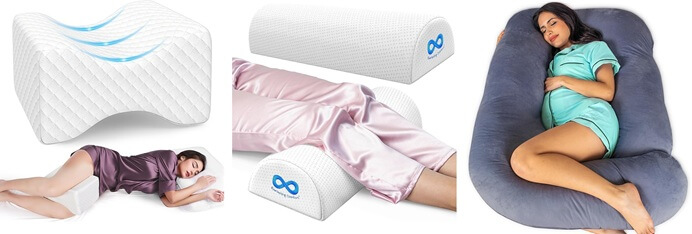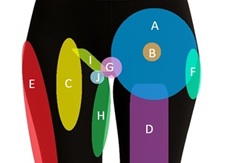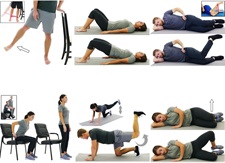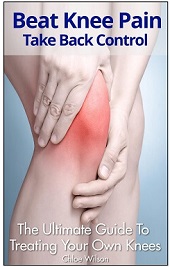- Home
- Hip Pain Diagnosis
- Hip Pain At Night
Hip Pain At Night
Written By: Chloe Wilson, BSc(Hons) Physiotherapy
Reviewed by: KPE Medical Review Board

If you struggle with hip pain at night, you are not alone. Millions of people experience discomfort in their hips when lying in bed or trying to sleep.
Hip pain in bed may wake you up, stop you getting to sleep or make it difficult to roll over.
It may be an aching pain, sharp pain, tingling or burning sensation.
There are lots of possible causes of hip pain when sleeping such as hip bursitis, arthritis, tendonitis, your sleep position or even your mattress.
Here we look at the common causes of hip pain at night, associated symptoms, when you should see a doctor, the best treatment options and how to prevent hip pain in bed and ensure you get a good night’s sleep.
Common Causes of Hip Pain at Night
There are many different reasons why you might notice hip pain when sleeping. For some people, the pain is sharp and stabbing, while for others it feels like a deep ache that worsens the longer they stay in bed.
Let’s look at the most common causes of hip pain at night and how they typically present.
1. Hip Arthritis
Hip arthritis, particularly osteoarthritis, is one of the most common reasons for hip pain in bed, particularly in people over the age of 60.
With arthritis, the smooth cartilage inside the hip joint wears down, causing the bones to rub together. This leads to stiffness, inflammation, and pain that often worsens at night.
People with hip arthritis usually describe:
- Deep aching pain in the groin, thigh, or buttock
- Stiffness in the morning or after resting with reduced hip range of motion
- Clicking or grinding sensation in their hips when moving
- Hip pain worse at night that disrupts sleep
Rheumatoid arthritis and other inflammatory types of arthritis can also cause hip pain in bed, often with additional swelling or heat around the joint.
2. Hip Bursitis
Hip bursitis is another leading cause of pain in the hip when sleeping. Bursa are small, fluid-filled sacs that sit between bone and soft tissue to reduce friction.
Irritation or inflammation of the bursa from repetitive movements, pressure overuse or an injury can result in hip bursitis. Any pressure through the inflamed bursa results in pain.
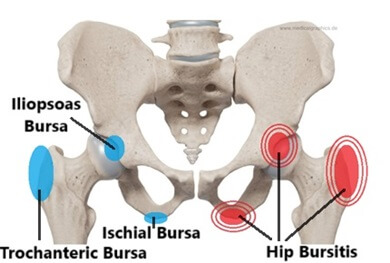
There are two types of hip bursitis that commonly cause hip pain when sleeping:
- Iliopsoas Bursitis: causes front hip pain and groin pain
- Trochanteric Bursitis: causes outer hip pain aka Greater Trochanteric Pain Syndrome
Bursitis hip pain often feels:
- Sharp, aching or burning hip pain at night
- Worse when lying on the affected side (particularly trochanteric bursitis), leading to sore hip when sleeping.
- Tender to touch around the bony part of the hip.
Hip bursitis commonly affects people who spend long periods sitting, stand on hard surfaces, or have a leg length difference.
3. Hip Tendonitis
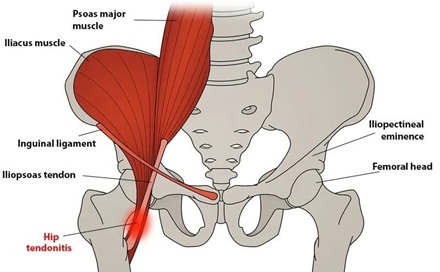
Hip tendonitis occurs when the tendons around the hip joint become inflamed due to overuse or repetitive strain, particularly if you have suddenly increased your activity levels. Tendons are the thick cord-like structures that connect muscles to bone.
The most common types of hip tendonitis to cause hip pain sleeping are hip flexor tendonitis (front of hip) and gluteal tendonitis (outer hip).
Common symptoms of hip tendonitis include:
- A nagging, aching pain in hip at night, especially after activity.
- Pain that worsens when climbing stairs or rising from a chair.
- Stiffness and discomfort that make sleeping with hip pain more difficult.
Because tendons tighten when inactive, lying still in bed often makes hip tendonitis symptoms flare up causing pain in hip when sleeping.
4. Hip Flexor Strain
A common cause of front hip pain at night is a pulled or strained hip flexor muscle. It occurs when one of the hip flexor muscles is overstretched or torn, usually during sudden, explosive movements or from repetitive overuse.
Hip flexor strains can make it painful to lie flat or roll over in bed and are common in athletes, runners, or anyone who suddenly increases their activity levels, particularly if there is muscle tightness.
Typical signs of a hip flexor strain include:
- Sudden, sharp pain at the front of the hip or groin
- Weakness and/or stiffness in the hip which may limit hip range of motion
- Difficulty with daily activities e.g. running or climbing stairs
- Hip pain when sleeping flat or stretching the hip backwards
While usually temporary, hip flexor strains can make it hard to find a comfortable sleeping position.
5. Sleep Position &
Mattress
Sometimes pain in the hip at night isn’t caused by an injury or condition, but the way you sleep. Side sleepers in particular often notice their hip hurts while sleeping because of the direct pressure on the hip joint.
Other sleep-related factors include:
- A mattress that is too soft, causing the hips to sink out of alignment.
- A mattress that is too firm, leading to pressure points and hip pain in bed.
- Side sleeping with the top leg in front, which twists the hips and lower back.
Improper sleep position is a simple but common cause of hip pain while sleeping, especially in otherwise healthy individuals. If you are waking up frequently during the night due to hip pain, chances are that your sleep position is playing a part.
6. Piriformis Syndrome
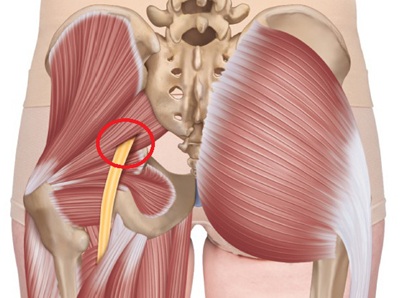
Hip pain at night that is associated with tingling or numbness may be due to piriformis syndrome.
The piriformis muscle lies deep in the buttock and sits close to the sciatic nerve. When the muscle becomes tight or irritated, it can press on the nerve, causing pain in the buttock and hip.
People with piriformis syndrome often notice:
- Aching or burning pain in the buttock that radiates to the outer hip or thigh and may extend to the knee or foot
- Tingling or numbness down the leg at night.
- Bad hip pain at night when sleeping on the back or side.
Because the piriformis muscle is affected by prolonged sitting or lying still, symptoms often get worse at night. Doing piriformis stretches before going to sleep can help you get a better night’s sleep.
7. Pregnancy
Pregnancy is a very common time to experience hip pain sleeping on side. Hormonal changes loosen the ligaments around the pelvis, while the growing baby shifts your posture and puts added stress on the hips and spine, especially during the third trimester. Around a quarter of expectant mothers experience symphysis pubis dysfunction during pregnancy.
Expectant mothers often experience:
- A dull ache in the hips or groin
- Hip pain in bed when lying on one side for too long and when rolling over in bed
- Relief with a body pillow or supportive cushion
Hip pain in pregnancy usually improves after delivery, but it can be very disruptive during the later months, but there are some simple things you can do to help like using a hip pillow for sleeping.
8. Over-Exercising or
Overtraining
Doing too much physical activity, too quickly, is another frequent trigger for bad hip pain at night. Running, cycling, or weight training without enough rest can strain the muscles, tendons, and joints around the hip.
This type of overuse pain typically:
- Feels worse after a day of activity
- Flares up in the evening and causes pain in hip when sleeping
- Improves with rest, stretching, and recovery strategies.
Athletes and active individuals often find that hip pain from sleeping is their body’s way of signalling that it needs downtime.
Other Possible Causes
We have looked at the most common causes of hip pain at night but there are other factors that may also contribute to sore hips when sleeping:
- Age: As we get older, joint tissues wear down, making pain in hip at night more likely. Approximately twenty percent of people over 60 complain of hip joint pain at night
- Overweight/Obesity: Carrying extra weight adds pressure on the hips during the day which can increase the risk of developing bad hip pain at night
- Accident or Injury: A fall, fracture, or sports injury may flare up at night.
- Referred Pain: Sometimes the hip isn’t the true source — pain from the back, pelvis, or even abdomen can radiate to the hip, especially at night.
When To See A Doctor
While most cases of hip pain when sleeping aren’t serious and will improve with simple treatments, you should consult a healthcare professional if:
- Hip pain at night doesn’t improve with rest or simple measures
- Pain is severe enough to wake you regularly or keep you awake for long periods
- You also notice swelling, redness, or warmth around the hip
- Pain radiates down the leg, causing numbness, tingling, or weakness
- You have a history of injury or surgery in the hip
- You are struggling to walk or bear weight through the leg
Persistent pain in the hip at night should never be ignored, as it may signal an underlying condition needing treatment. Your doctor may send you for imaging studies e.g. x-rays or MRI scan or blood tests.
#CommissionsEarned from Amazon on qualifying purchases
Treatment for Hip Pain
at Night
The right treatment depends on what is causing your hip pain in bed, but the aim is always the same — reduce pain, improve hip function, and help you sleep more comfortably. Here are the most effective approaches for reducing hip pain while sleeping:
1. Medication
Over-the-counter painkillers such as paracetamol or ibuprofen can be helpful for reducing bad hip pain at night. Non-steroidal anti-inflammatory drugs (NSAIDs) not only ease pain but also calm inflammation in conditions such as hip bursitis or tendonitis.
Many people find Omega-3 fish oils helps to reduce hip pain sleeping as it helps to improve joint nourishment.
Always follow medical advice and dosing instructions with any medications.
2. Ice and Heat Therapy
Another good way to reduce bad hip pain at night is to use:
- Ice Packs: Reduce swelling and inflammation, especially after activity. Particularly helpful with acute conditions
- Heat Pads Or Warm Baths: Help to relax stiff muscles and joints before bed.
Rotating between hot and cold can be particularly helpful for a sore hip when sleeping.
3. Rest and Activity Modification
Giving your hip a break from aggravating activities, like running, cycling, or repetitive bending, allows healing. This doesn’t mean total bed rest — gentle movement and low-impact activities such as swimming or walking can help prevent stiffness and restore hip range of motion.
Try and avoid strenuous exercise in the evenings to allow your body time to recover so you don’t have a sore hip when sleeping.
4. Physical Therapy & Exercise
Targeted physiotherapy exercises can make a big difference with hip pain sleeping. A therapist can show you:
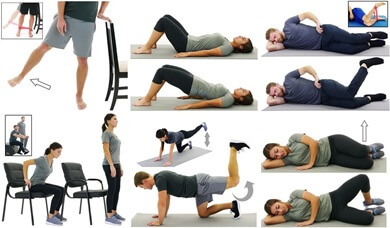
- Stretches: to release tight muscles such as the hip flexors or piriformis
- Strengthening Exs: for glutes, core, and hip muscles to reduce strain
- Posture And Movement Training: to prevent recurrence of hip pain while sleeping
5. Mattress Adjustments
Your mattress plays a huge role in hip pain during sleep. A mattress that is too soft allows your hips to sag, while one that is too firm increases pressure. For many people, a medium-firm mattress offers the right balance of support and comfort. Memory foam or hybrid mattresses can help distribute weight more evenly and reduce pressure points.
But before going out and buying a new mattress, try a simple mattress topper to see if that helps, alongside the other treatments suggested here.
6. Pillow Support
Adding pillows is a simple but highly effective way to ease hip pain from sleeping:
- Side Sleepers: Place a hip pillow for sleeping between your knees to keep hips aligned by stopping the top leg rolling forwards
- Back Sleepers: A half moon pillow under the knees can relieve strain on the hips and lower back
- Pregnancy: A full-length body pillow or wedge cushion can make a big difference to hip pain during pregnancy, particularly when sleeping on your side
Check out our Amazon Storefront for the best hip pillows for sleeping.
#CommissionsEarned from Amazon on qualifying purchases
7. Changing Sleep Position
Sometimes the best fix for hip joint pain at night is simply adjusting how you sleep. If you normally lie on the painful hip, try:
- Switching sides
- Sleeping on your back with pillows for support
- Using a slight incline (adjustable bed or wedge cushion) to take pressure off the hips
Experimenting with position often helps reduce hip pain when sleeping without the need for medication.
8. Lifestyle Changes
A few everyday changes can really help if your hip hurts at night:
- Weight Management: Maintaining a healthy weight reduces pressure on your hips.
- Balanced Exercise: Alternate high-impact workouts with gentler activities. Do hip stretches before going to bed each night and hip strengthening exercises in the morning.
- Avoid Prolonged Sitting: Get up regularly during the day to keep your hips mobile.
Making these adjustments lowers stress on the hip joint and reduces hip pain sleeping.
9. Good Sleep Hygiene
Pain feels worse if your sleep quality is already poor. Good sleep habits make it easier to fall and stay asleep even if your hip hurts at night:
- Keep a consistent bedtime routine
- Make your bedroom cool, dark, and quiet
- Avoid screens, caffeine, alcohol and heavy meals before bed
- Try relaxation techniques such as deep breathing, meditation, or gentle stretching

10. Injections
For stubborn cases such as hip bursitis or arthritis, corticosteroid injections can quickly reduce inflammation and ease hip pain while sleeping. These are usually performed by a doctor under ultrasound guidance. Make sure to take it easy for a couple of days after a hip injection.
11. Surgery
Surgery is rarely needed for hip pain at night, but in severe cases of hip arthritis or structural joint damage, procedures such as hip replacement may be recommended if other treatments fail.
Preventing Hip Pain While Sleeping
Simple lifestyle adjustments can help prevent hip pain from sleeping:
- Sleep on your back or with a pillow between your knees if lying on your side
- Choose a supportive mattress that keeps your hips aligned
- Stretch and strengthen your hip muscles regularly to maintain flexibility
- Avoid overtraining — give your hips time to rest between workouts
- Maintain a healthy weight to reduce pressure on your hips
- Stay active during the day to stop joints from stiffening overnight
Frequently Asked Questions
Why Is My Hip Pain Worse
At Night?
Why Is My Hip Pain Worse At Night?
Hip pain often feels worse at night and better in the day because joints stiffen when you are inactive, inflammation increases during the day and pressure builds when lying in bed. Conditions such as arthritis, bursitis, or tendonitis commonly flare up in the evening, making hip pain at night more noticeable.
Why Does My Hip Hurt
When Sleeping?
Why Does My Hip Hurt When Sleeping?
Hip pain when sleeping is usually caused by pressure on the hip joint, poor mattress support, or underlying conditions such as bursitis, arthritis, or a muscle strain. Sleeping on your side without proper cushioning can also trigger discomfort.
How Do I Stop My Hip
From Hurting When Sleeping?
How Do I Stop My Hip From Hurting When Sleeping?
To reduce hip pain during sleep, try using a supportive mattress, placing a pillow between your knees, or changing sleep positions. Stretching, gentle exercise, and heat therapy before bed can also ease stiffness.
Can A Bad Mattress Cause Hip Pain At Night?
Can A Bad Mattress Cause Hip Pain At Night?
Yes. A mattress that is too soft can make your hips sink, while one that is too firm can create pressure points, both of which lead to hip pain in bed. A medium-firm mattress with good support is often best.
Is Hip Pain At Night Cancer?
Is Hip Pain At Night Cancer?
In most cases, hip joint pain at night is not caused by cancer. Far more common reasons include arthritis, bursitis, tendonitis, or poor sleep posture. However, if your pain is persistent, worsening, or accompanied by symptoms like unexplained weight loss, night sweats, or fatigue, it’s important to see a doctor to rule out more serious causes.
Can Sleeping Position Cause Hip Pain?
Can Sleeping Position Cause Hip Pain?
Absolutely. Side sleeping without proper support can strain the hip and put pressure through the different structures, while stomach sleeping may twist the spine and hips. Adjusting your sleep position and using pillows for support can reduce hip pain from sleeping. If you are a side sleeper, try a knee support pillow or if you sleep on your back, try a half moon pillow.
Does Hip Pain At Night Mean Arthritis?
Does Hip Pain At Night Mean Arthritis?
Not always. While arthritis is a common cause of hip pain while sleeping, other conditions like bursitis, tendonitis, piriformis syndrome, or even pregnancy can also trigger night-time hip pain.
Arthritis hip pain is typically worse after prolonged rest and accompanied by reduced hip range of motion, particularly first thing in the morning.
Is It Normal For Hips To Hurt During Pregnancy At Night?
Is It Normal For Hips To Hurt During Pregnancy At Night?
Yes, many women experience hip pain sleeping on side during pregnancy. Hormonal changes loosen ligaments and added weight puts strain on the hips. Supportive pillows and side-lying with a cushion between the knees can really help.
What Causes Burning Hip Pain At Night?
What Causes Burning Hip Pain At Night?
A burning pain in the hip at night is often linked to nerve irritation, such as sciatica or piriformis syndrome, or hip bursitis. It can also be caused by tendon irritation. Burning sensations are usually nerve-related, so it is worth checking with a doctor if it persists.
What Causes Throbbing Hip Pain At Night?
What Causes Throbbing Hip Pain At Night?
A throbbing hip pain at night is usually a sign of inflammation, commonly from bursitis, tendonitis, or arthritis. Throbbing pain tends to worsen when lying still, as fluid builds up and irritates tissues in the joint.
What Is The Best Sleep Position
For Hip Pain?
What Is The Best Sleep Position For Hip Pain?
The best position for sleeping with hip pain is usually on your back with a pillow under your knees, as this reduces strain on the hip joint. If you prefer side sleeping, placing a firm pillow between your knees keeps the hips aligned and relieves pressure.
Hip Pain At Night Summary
Hip pain at night can be incredibly disruptive, leaving you tired and sore the next day. Common causes of hip pain during sleep include hip bursitis, arthritis, hip tendonitis, sleep position and muscle strain.
Whether your hip pain in bed stops you getting to sleep, wakes you up or causes pain and stiffness in the morning, there is lots that you can do to help. Most cases improve with simple treatments such as stretching, physiotherapy, ice/heat, better sleep positioning or changing your mattress, but persistent or severe pain should always be checked by a doctor.
By understanding the causes and making small changes, you can reduce bad hip pain at night, enjoy better rest, and wake up refreshed instead of sore.
You may also be interested in the following articles:
- Front Hip Pain
- Inner Hip Pain
- Outer Hip Pain
- Hip Range Of Motion
- Knee Pain Diagnosis Charts
- Knee Pain At Night
Related Articles
Common Knee Problems
July 2, 2025
Hip Pain Diagnosis
September 16, 2025
Hip Strengthening
September 24, 2025
Medical & Scientific References
- Sleep Quality And Nocturnal Pain In Patients With Hip Osteoarthritis. Medicine Journal
- 17 Ways To Relieve Your Hip Pain At Night. New Mexico Orthopedics
- Hip Pain At Night (Sleeping): Causes And Symptoms. Spire Healthcare
Last Updated: October 2nd, 2025
Next Review Due: October 2nd, 2027
